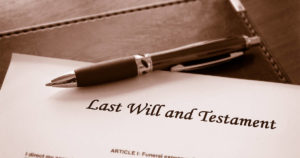
Upon the death of an individual, their property and assets are usually disposed according to their wishes in their will. Occasionally, the way the assets and property were distributed may be contested. For a will to be valid, the testator must have testamentary capacity to create the will.
Testamentary capacity is the testator’s mental ability to make a valid will. One must also be at least 18 years old to create a will. The testator must be of sound mind and judgment when making the will. Specifically, the testator should know the identity of the will’s beneficiaries, the property being disposed of and owned by the testator, the fact that a will is being created, and how the property will be distributed by the will.
Contested wills are often based on the heirs’ claims of the testator’s lack of requisite mental capacity at the time of making the will. Since older adults create wills, chances of onset dementia and loss of mental capacity are greater. Usually, heirs who receive less than expected from the will claim lack of testamentary capacity.
Mental Capacity Critical Upon Creation of the Will
Even if the testator had diminished mental capacity during the creation of the will, if it was created, modified or revoked during a period of lucid interval in that period, the will is valid. Testamentary capacity is only required at the time the will was drafted. The fact that the testator lost their mental capacity later does not have bearing on the validity of the will.
Legal Presumption of Testamentary Capacity
There is a legal presumption that the testator had the requisite testamentary capacity. Therefore, those contesting the will have the burden of proving that the testator lacked the mental capacity. In some jurisdictions, if the bulk of the will is not given to the immediate family members, the courts may construe that the testator did not have the requisite mental capacity.
Showing of Testamentary Capacity or Lack Thereof
In order to contest a will based on lack of testamentary capacity, the contestant can show that the testator was suffering from a mental capacity at the time the will was made through medical records and the physician’s testimony. The evidence should clearly show that the testator lost the integrity of their mind and could not understand their actions. Similarly, the defense of a will can also be shown by physician testimony or medical records.
Philadelphia Litigation Lawyers at the Harty Law Group Help Clients with Issues Regarding Testamentary Capacity
When a will is contested by the heirs, it often leads to litigation. For evaluation of your claims, contact an experienced and dedicated Philadelphia litigation lawyer at the Harty Law Group. Our team of professionals handle all matters of litigation and provide in-depth counseling on many legal issues. For an initial consultation, contact us online or call us at 267-383-3899. With office locations in Philadelphia and Haddonfield, New Jersey, we serve clients throughout Pennsylvania and New Jersey.

